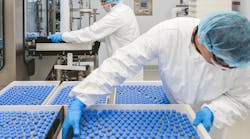On April 29, Gilead Sciences, Inc, announced that an experimental antiviral treatment was showing significant results in government-run tests. Preliminary results from tests on COVID-19 patients showed patients prescribed the treatment, called remdesivir, recovered 31% faster than patients who received a placebo.
Dr. Anthony Fauci, head of the National Institute of Allergy and Infectious Diseases, which ran the trial, called the finding “highly significant,” but cautioned that the effectiveness of the drug still needs to be analyzed. Later, during a meeting with President Trump, Dr. Fauci said “The data shows that remdesivir has a clear-cut, significant, positive effect in diminishing the time to recovery.”
On May 1, Gilead received an Emergency Use Authorization for the drug. EUAs have been issued for a number of coronavirus testing procedures. Dr. Fauci made comments to the press Wednesday that he had spoken to the Chairman of the FDA about accelerating the drug’s availability, and on the same day, Gilead CEO Daniel O’Day wrote an open letter saying the company would ramp up production and donate the courses.
While remdesivir does appear to reduce the amount of time a patient takes to recover from the coronavirus, and the NIAID reports that its own results may suggest a slight improvement on mortality rates among patients who took the drug, it does not cure the infection. Dr. Fauci, in comments to the Associated Press, said that while the drug was not an “overwhelming cure,” its widespread use would free up hospital beds and help destress the medical system.
Under ordinary circumstances, the information about a drug’s effectiveness wouldn’t be released as early as it has been for Remidesivir, but, according to Dr. Fauci, the evidence was “clear-cut” enough that scientists had an obligation to tell patients in the placebo group so they could get treated as well.
According to Gilead, the drug has been in development for several years now. “Remdesivir is an investigational nucleotide analog with broad-spectrum antiviral activity,” says Gilead’s website. While the compound is not currently approved for medical use anywhere, “limited preclinical data” show remdesivir is effective against MERS and SARS, respiratory diseases similar to the COVID-19 virus, a.k.a. SARS-COV-2. “The limited preclinical data on remdesivir in MERS and SARS indicate that remdesivir may have potential activity against COVID-19,” says Gilead.
